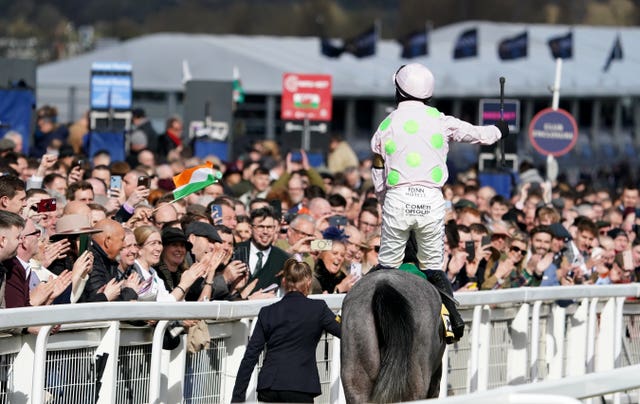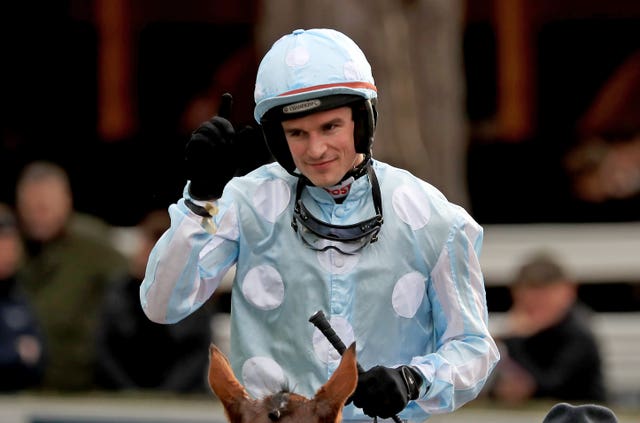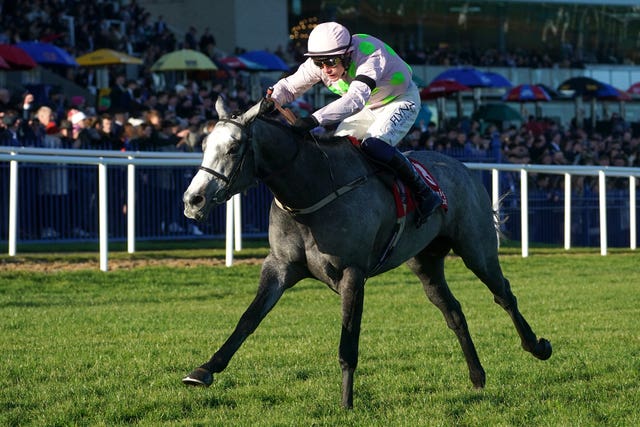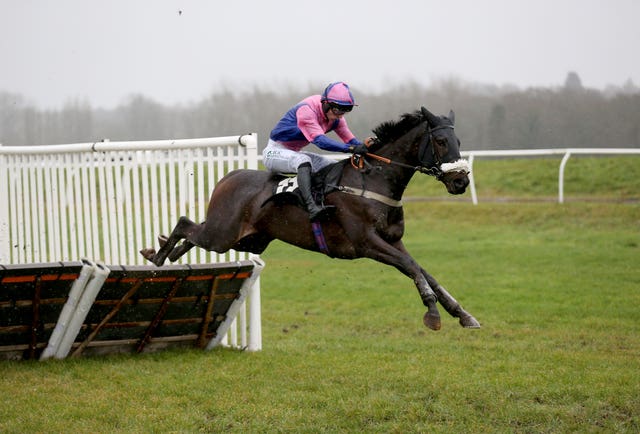Stubbornness and occasional obstinacy are two of my less desirable characteristics, writes Jon Shenton. That may explain my historically neutral view of the Cheltenham Festival. Sure, I look forward to it, enjoy the seemingly 12-month build up to the next one and attend every year for at least one day.
However, I haven’t really “got it” in the same way that others seem to. I’m sure I’ve spouted the cliché of a winner at Southwell pays the same as a winner at Prestbury Park on more than one occasion to a non-plussed audience (and perhaps in one of these articles, too!). However, that’s all starting to change, mainly through penning my latest articles on the novice hurdling programme and linking it to Cheltenham. Now it all suddenly and finally makes sense.
Invigorated by that exercise, then, this article will focus on entirely on the Triumph Hurdle, which kicks off proceedings on the final afternoon, Gold Cup Friday, of the four-day fixture.
Graded Race Form
My first port of call was to evaluate the paths that previous winners have trodden on the way to a place in the history books at the Festival. Below is a table documenting each winner dating back to 2010, containing all same season graded hurdle races with the associated finishing position and the winning horse name from the latest renewal.

The table has two clear pointers. Firstly, the market is broadly a good guide in establishing the name of the likely winner. Seven of the last ten winners have returned a single figure price (and Tiger Roll only just a double figure one at 10/1). Countrywide Flame and Pentland Hills bucked the trend with their more exotic 33/1 and 20/1 SP’s.
Secondly, as well as the market pathfinding for punters, Graded form looks to be important, with every single champ having cut their teeth at Graded level apart from the aforementioned Pentland Hills. I make it nine graded wins in total from 15 starts between the last ten Triumph winners.
The Pentland question is still important to acknowledge, with Nicky Henderson's charge either a trend-buster or a potential new trend-setter. Last years’ champion prevailed following a single run (and win) over hurdles in a £4k Class 4 event at Plumpton after an only slightly ascendant flat career.
I’d be inclined to conclude that the Pentland way is more likely to be an irregular occurrence. Moreover, due consideration needs to be paid to the specifics regarding last year's renewal. It was a difficult affair, with the ill-fated Sir Erec going wrong in the early stages of the race. The market, vibes and form all pointed to the Joseph O’Brien starlet running a big race and his exit changed the complexion, and perhaps the result of the 2019 edition. All ifs, buts and maybes but I see very little reason to deviate from the tried and tested form and/or the market as the starting point.
In terms of specific staging posts en route to a Cheltenham coronation, it’s of little surprise that the Grade 1 Spring Juvenile Hurdle at Leopardstown is a key pointer to the Triumph. No less than five of the ten winners listed have taken in this (sort of) Dublin race on the Festival trail. That may be a tick in the box for A Wave of the Sea, Aspire Tower and Cerberus in terms of the key market fancies.
Taking the UK angle, the Adonis is interesting. It's a race which was won by Soldatino and Zarkandar in 2010 and 2011 respectively. For both, it was their only UK run prior to their triumphs in the Triumph: exactly the same set of circumstances apply to Solo of the 2020 vintage.
Expanding on this theme, the table below shows the chief protagonists for the 2020 renewal, with their graded form to date. It’s sorted in current ante-post market order.

If graded form is a key then Solo, Allmankind, Aspire Tower, A Wave of the Sea, Cerberus and Burning Victory have the potential to unlock the Triumph Hurdle door. That spells bad news for Sir Psycho, potentially Mick Pastor (6th in the Prestbury Juvenile Trial) and, most strikingly, Goshen. The Gary Moore-trained horse has a lofty reputation and is currently a general 4/1 in the market after three bloodless wins in lesser company. There is no doubt that the Triumph will be a big step up in class, one which he may well be perfectly capable of taking, but he doesn't fit the recent mould of winners of this race. Luckily there are ratings available which present tangible data on how big a leap might be required to take the spoils back down to Moore's Sussex yard.
Rating the Triumph
To ascertain if Goshen and his rivals have displayed “good enough” credentials to indicate competitiveness in the Triumph, I thought it’d be of interest to compare ratings of their past performances against the historic winners dating back to 2010. For this comparison I’ve used Racing Post Ratings (RPR), which as far as I can tell have been generated using a consistent methodology over the ten-year period (I’m happy to be corrected if otherwise).
Only races over hurdles have been included. The RPR is helpfully part of the geegeez.co.uk toolkit so obtaining this intel is relatively straightforward, albeit manual in nature.
Prior to discussing the data, a quick explanation of the columns, in left to right order.
- Win RPR – the Racing Post Rating given to the winner for their run in the Triumph
- Price – Current Market Price for the 2020 Triumph contenders
- 5LR to LR – 5th last run if applicable through to the last run (LR) RPR's
- High – best RPR recorded over hurdles prior to the Triumph
- Low – lowest RPR recorded over hurdles prior to the Triumph
- Avg – the average RPR of all hurdle runs prior to the Triumph
It’s sorted by the last run (LR) column and I’ve signposted this year's crop with white rows, light blue relating to previous winners.

Laid out in this manner the table gives some valuable clues as to the likely shake up of the Triumph. The general shape reflects well on the class of 2020, showing that most of the main players have been pitching at a sufficient level over the course of this season to indicate that they have the potential to develop into Triumph winners.
Based on average RPR, three of the 2020 crop rank in the top five (Solo, Goshen and Aspire Tower). Although, it could easily be argued that there is a partial picture here, as it only includes winners from previous renewals, not the whole field. For example, Sir Erec ran to an RPR of 146 on his final outing prior to Cheltenham last year and, as he didn’t win, this is not included. However, even accounting for this it does indicate a high-quality renewal this year if all prospective runners make it to the starting tape.
It’s also logical to conclude that some of the longer shots (Mick Pastor, Sir Psycho, Burning Victory and Fujimoto Flyer) will have to improve significantly to prevail on Gold Cup Friday. Our old mate Pentland Hills’ Plumpton run gleaned an RPR of 128, demonstrating that a relatively low rating in a last run is not necessarily a barrier to onward success; but, PH aside, all other winners ran to at least 136 on their previous outing.
The lowest Triumph-winning RPR in the dataset is 144, and it belongs to household name Tiger Roll for his 2014 victory. This puts into context how much the animals with ratings in the 120’s or low 130’s last time out will have to improve. Notably, four of this year's field have already delivered RPR’s on or around that Tiger Roll winning rating and might be expected to improve further on the 13th March. It’s hard to see the horses at the lower end of the table improving beyond them if any of the main four take a step forward.
Solo’s 145 RPR from the Adonis is also noteworthy. The race was run just over four seconds slower than the Kingwell over the same course and distance on the same card. Perhaps the relatively high rating is a surprise, at first glance anyway. However, the RPR allocated to the winner of the Kingwell (Song for Someone) was a meaty 152 which gives a relative feel to the performance. It was visually impressive from Solo, and the RPR backs it up.
Arguably, Goshen is the most interesting in the RPR context given his lack of graded form. His RPR performance has metronomic consistency at 142 or 143 over the trio of his hurdle runs to date, having barely seen a rival in those three outings prevailing by a combined 68 lengths! Given his lack of experience at the higher level it should be of some reassurance to Goshen backers and fans that his race ratings are right on the money in these lower-class affairs. Based on ratings alone he is a very serious contender.
The trainers
Reviewing the trainers' record with juvenile hurdlers may offer another clue to the eventual winner. Using horseracebase the below table shows their complete records in juvenile hurdle events in the UK and Ireland. It only includes trainers of horses that are 20/1 or shorter in the Triumph Hurdle ante-post market currently.

The data confirms that Gary Moore is a superb handler of juvenile hurdlers. There must be a couple of nice angles hidden within this table, perhaps for another time/edition of Punting Angles. The Nicholls operation, too, is meritorious and deserves closer inspection on another occasion.
Overall, it’s a nice insight but in terms of significant pointers for Cheltenham it doesn’t really help, so evaluating performance at the track should be an interesting and logical next step.

There are some astonishing numbers in the table above, one in particular: Willie Mullins’ 0-from-41 in juvenile hurdles at Cheltenham is the most extraordinary stat of all, although Gary Moore’s 1-from-40 is also equally startling. We’re fishing in small pools of data and the degree of relevance can be argued. That said, data are data and, consequently, a certain degree of bravery and belligerence is required to back Burning Victory or Goshen once you’ve digested these numbers.
To micro-analyse a little further, the table below shows performance only in four-year-old hurdles at the Cheltenham Festival. This includes data from the Triumph and the Fred Winter/Boodles.

All of Mullins’ 41 runners have been at 'the Fez' and include luminaries such as Footpad and Apples Jade. Moore hasn’t notched in 17 appearances, hitting the place crossbar only twice from those runs. Paul Nicholls' horses are obviously serious propositions; and Skelton, O’Brien and de Bromhead only have a handful of representatives between them, although it is worth noting that whilst Aiden O’Brien was the trainer of 2016 winner Ivanovic Gorbatov, it is widely rumoured that Joseph had a significant role to play in that victory. Overall though, trainer data points to negatives for Goshen and Burning Victory.
Race Composition – Pace to Burn
I’ve attempted to build a pace map of the chief protagonists below: it is constructed in line with the methodology and numbers deployed within geegeez pace maps.
- 4 – led
- 3 – Prominent
- 2 – Mid-Division
- 1 – Held up

Above is the individual race profile of each of the contenders in numerate form and below is a graphical representation of their average pace preference based on their hurdle runs thus far.

A lot of talk regarding this race is in relation to a likely pace burn up. The data backs that up with bells on. The top three in the market have all pretty much only ever cut out the running in their recent hurdles starts, with Cerberus and Sir Psycho preferring to race near the head of affairs, too. The addition of the other less fancied runners may further spice to the already fiery pace platter. It would be very, very surprising if this race is run at anything other than a fast and honest gallop.
Based on visual evidence, Goshen and Allmankind appear to be the ones that are most likely bolt on when the flag is dropped. There is a definite possibility of those two damaging each other by over-racing and it’ll be fascinating to see how they react to a bit of competition for the lead, although Goshen can take back as he did between the third and fifth flights last time.
Perhaps Aspire Tower gives the impression of being slightly the least headstrong of the trio which may mean he could pick up the pieces, but that equally could apply to any of the others. Despite the RPR numbers appearing to downplay the prospects of Burning Victory and Mick Pastor, maybe the race composition brings them into play a little.
Summary and conclusions
If you’re after a tip then you’re probably reading the wrong article! However, after evaluating each horse's path to the Triumph, their RPR performance, trainer records and the likely pace composition it’s fair to say that there are a plethora of pros and cons to evaluate, many of them ostensibly contradictory.
Of the four market leaders I favour Goshen the least: his lack of Graded form, Moore’s record at Cheltenham with juveniles, and his want-the-lead run style are all negatives in my view. Further, he has jumped markedly to the right in all three of his hurdle races, which is obviously sub-optimal in a Championship race at left-handed Cheltenham, and I do wonder how he will react under pressure as for the first time he is unlikely to get it all his own way, as the ratings and pace profile demonstrate.
Of the four I’d side with Aspire Tower, a perspective that’s driven by current prices as much as anything else. Along with Solo he has the best RPR from a previous hurdle race and I think he could be a good value play, although he is not the most likely winner and does have to bounce back from a fall in the Spring Juvenile Hurdle at Leopardstown.
The pace composition holds the key for me: a furious gallop could easily leave the door ajar for horses at the lower end of the pace profile, and maybe not the most fancied in the field. Based on evidence to date it’s likely to be a mega burn up, but if I know that then of course all the trainers, jockeys and pundits know it too. That makes it even more intriguing and I wouldn’t be surprised to see a change in tactics attempted by at least one of the main pace pushers. Good luck holding Goshen and Allmankind back though!
If I was putting my money down today based on this analysis, I would side with Aspire Tower and maybe A Wave Of The Sea all things considered. Along with Solo they tick more of the boxes and possibly have more versatility regarding how the tactics play out. The unappealing price for Solo leads me to the other two, though it will be far from a shock should Solo win as he is the likely favourite.
It would also be no surprise to see Goshen or Allmankind break the field apart! Whatever happens, it’s a genuinely fascinating race: the more I’ve looked at it the more I can’t wait to see how things shake down. I’ll be there to watch it in the flesh, and I haven’t looked forward to a single race as much in my life.
- JS













